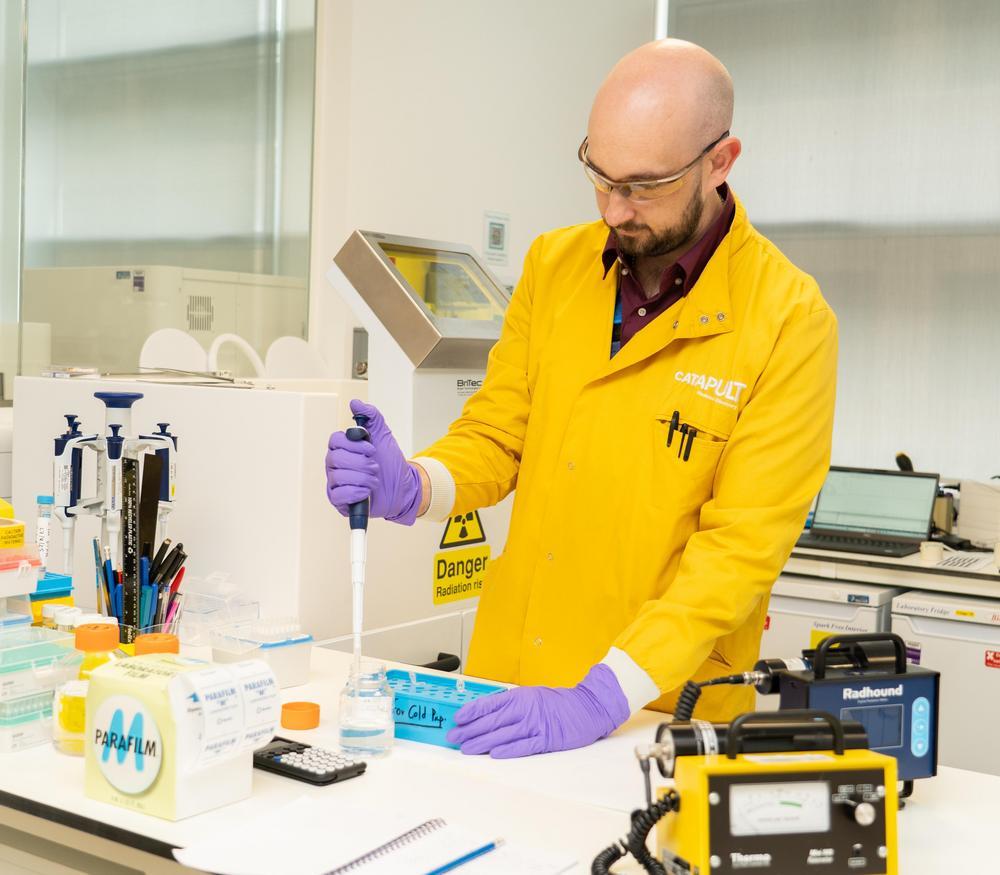The UK’s used nuclear materials will be recycled to create an evergreen supply of new precision cancer medicines, offering hope for patients with previously untreatable cancers.
18 November 2025

The UK is set to give a unique second life to used nuclear materials. A £9.9m investment from the Innovate UK Sustainable Medicines Manufacturing Innovation Programme (SMMIP), backed by a further £8.9m from industry, will support a major project to develop cutting-edge new treatments for cancer.
Led by United Kingdom National Nuclear Laboratory (UKNNL) and Medicines Discovery Catapult (MDC), the project will use a radionuclide called lead-212 to create treatments called Targeted Alpha Therapies.
These treatments are a type of precision medicine, known as radiopharmaceuticals. Whilst radionuclides are already used worldwide for medical scans to diagnose cancer and other conditions, Targeted Alpha Therapy is an exciting new application. Lead-212 could offer hope to patients with cancers that are currently hard to treat by targeting and destroying cancer cells with minimal damage to healthy tissue and reduced side effects.
UKNNL has developed a way to harvest a sustainable supply of lead-212 from recycled nuclear fuel that has already been used to power homes across the country.
A tiny amount of lead-212’s parent material – equivalent to a single drop of water in an Olympic-sized swimming pool – is extracted through a series of chemical reactions. An even tinier amount of lead-212 is taken from this sample, which, when developed under the right conditions by scientists at MDC, could treat thousands of patients.
The UK has large reserves of lead-212, meaning that this approach could be scaled up to power new cancer treatments for patients in the UK and worldwide.
The funding from the SMMIP will develop the foundations needed to support clinical trials and bring these treatments to patients. This will unlock the UK’s full potential as a global leader in this ground-breaking area of cancer care.
Science and Technology Secretary Liz Kendall said:
“Almost 3.5 million people in the UK are living with cancer – but scientific breakthroughs are giving hope to more of them and their families.
“It’s incredible to think that we could turn used nuclear fuel into cutting edge cancer treatments – but that is exactly what British scientific brilliance is making possible. Remarkable work like this, which could give cancer patients more priceless time with their loved ones, shows precisely why this Government is giving record funding to research and development.”
Julianne Antrobus, Chief Executive Officer at UKNNL, said:
“Through access to the UK’s sovereign supply of lead-212, we have a truly unique opportunity to transform our nuclear expertise into life-saving cancer treatments. Developed from recycled fuel that has already served the nation by powering homes, lead-212 can now serve us again by offering new hope to cancer patients.
“UKNNL is proud to co-lead this pioneering programme alongside Medicines Discovery Catapult. By developing the infrastructure and processes to unlock the UK’s lead-212 supply, we’re not only advancing precision nuclear medicine but also reinforcing the UK’s position as a world leader in both nuclear science and healthcare innovation. This investment will help us deliver treatments that could transform outcomes for patients with previously untreatable cancers, both here in the UK and globally.”
Professor Chris Molloy, CEO of Medicines Discovery Catapult, said:
“Lead-212 is an untapped national asset with extraordinary medical potential. By developing therapies from this uniquely sustainable source, with no additional waste, our consortium has the ambition to improve cancer care for patients and to position Britain once again at the forefront of medicinal radiochemistry. But ambition alone isn’t enough. We need the infrastructure to produce, trial, and scale this evergreen approach. The support from Innovate UK’s Sustainable Medicines Manufacturing Innovation Programme gives us the resources to realise our ambition, and is a clear signal that the UK is ready to innovate for patients here and around the world.”
Dr Mark Talford – Deputy Director, Medicines Manufacturing at Innovate UK, said:
“This project demonstrates the power of UK innovation to tackle some of the most pressing challenges in healthcare. By transforming legacy nuclear materials into life-saving cancer treatments, we are not only advancing precision medicine but also demonstrating how sustainability and science can work hand in hand. Through the Sustainable Medicines Manufacturing Innovation Programme, Innovate UK is proud to support this pioneering collaboration that will accelerate access to cutting-edge therapies for patients and strengthen the UK’s position as a global leader in both medicines and nuclear innovation.”
UKNNL is the Government’s lead civil national laboratory for nuclear fission whose mission is twofold: to enable and deliver nuclear outcomes for government, and to support growth of the UK nuclear sector. A national asset operating ground-breaking technology through world-class expertise, UKNNL is enabling the supply of new sources of medical isotopes for the UK. It collaborates with researchers to investigate new treatments and diagnoses, including cancer, Alzheimer’s and complex heart conditions. The handling of nuclear material and extraction of isotopes are key capabilities and skills that UKNNL provides for the nation.
MDC is a national Life Sciences service dedicated to turning drug discovery into impactful and commercial breakthroughs. It has a high-tech preclinical lab with world-class radiochemistry capabilities and advanced imaging technologies, unique within the UK and a major asset in the development and deployment of novel radiopharmaceuticals.
The project brings together world-class expertise to develop a complete ecosystem. Its five other consortium members are Cyclife Aquila Nuclear, PentaBind, Iksuda Therapeutics, Seda, and entX. Their combined capabilities will build the necessary infrastructure, develop and test the treatments, and deliver a strategy to bring these game-changing medicines to market.